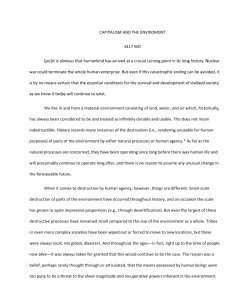CAPITALISM AND THE ENVIRONMENT [pic]It is obvious that humankind has arrived at a crucial turning point in its long history. Nuclear war could terminate the whole human enterprise. But even if this ca
CAPITALISM AND THE ENVIRONMENT [pic]It is obvious that humankind has arrived at a crucial turning point in its long history. Nuclear war could terminate the whole human enterprise. But even if this ca
CAPITALISM AND THE ENVIRONMENT
3417 WD
[pic]It is obvious that humankind has arrived at a crucial turning point in its long history. Nuclear war could terminate the whole human enterprise. But even if this catastrophic ending can be avoided, it is by no means certain that the essential conditions for the survival and development of civilized society as we know it today will continue to exist.
We live in and from a material environment consisting of land, water, and air which, historically, has always been considered to be and treated as infinitely durable and usable. This does not mean indestructible. History records many instances of the destruction (i.e., rendering unusable for human purposes) of parts of the environment by either natural processes or human agency.* As far as the natural processes are concerned, they have been operating since long before there was human life and will presumably continue to operate long after, and there is no reason to assume any unusual change in the foreseeable future.
When it comes to destruction by human agency, however, things are different. Small-scale destruction of parts of the environment have occurred throughout history, and on occasion the scale has grown to quite impressive proportions (e.g., through desertification). But even the largest of these destructive processes have remained small compared to the size of the environment as a whole. Tribes or even more complex societies have been wiped out or forced to move to new locations, but these were always local, not global, disasters. And throughout the ages—in fact, right up to the time of people now alive—it was always taken for granted that this would continue to be the case. The reason was a
